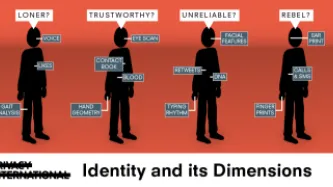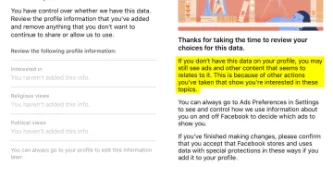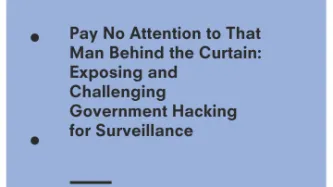Search
Content type: Examples
In May 2018, UK-based security researcher Robert Wiggins discovered that the mobile app TeenSafe, marketed as a secure app for iOS and Android, was storing data it collected on servers hosted on Amazon's cloud without a password and openly accessible. The app lets parents monitor their children's text messages, location, browsing history, and apps, as well as who they called and when, and does not require parents to obtain their children's consent. The insecurely stored 10,200 records included…
Content type: Long Read
It’s 15:10 pm on April 18, 2018. I’m in the Privacy International office, reading a news story on the use of facial recognition in Thailand. On April 20, at 21:10, I clicked on a CNN Money Exclusive on my phone. At 11:45 on May 11, 2018, I read a story on USA Today about Facebook knowing when teen users are feeling insecure.
How do I know all of this? Because I asked an advertising company called Quantcast for all of the data they have about me.
Most people will have never heard of…
Content type: Long Read
The Sustainable Development Goals (SDGs) are the United Nations-led initiative to define the development agenda. Building on the eight Millennium Development Goals, the SDG’s 17 goals – and the 169 targets – serve as an opportunity to tackle many of the most pressing issues in the world today. The SDGs are also explicitly grounded in human rights. Goal 16 on “peace, justice, and sustainable institutions” aims to “Promote peaceful and inclusive societies for sustainable development, provide…
Content type: Long Read
Privacy International’s new report shows how countries with powerful security agencies are training, equipping, and directly financing foreign surveillance agencies. Driven by advances in technology, increased surveillance is both powered by and empowering rising authoritarianism globally, as well as attacks on democracy, peoples’ rights, and the rule of law.To ensure that surveillance powers used by governments are used to protect rather than endanger people, it is essential that the public,…
Content type: Report
Countries with powerful security agencies are spending literally billions to equip, finance and train security and surveillance agencies around the world — including authoritarian regimes. This is resulting in entrenched authoritarianism, further facilitation of abuse against people, and diversion of resources from long-term development programmes.
Privacy International's report 'Teach 'em to Phish: State Sponsors of Surveillance' examines this problem closely, providng examples from US, China…
Content type: Long Read
Privacy International (PI) has today released a new report, 'Teach 'em to Phish: State Sponsors of Surveillance', showing how countries with powerful security agencies are training, equipping, and directly financing foreign surveillance agencies.
Spurred by advances in technology, increased surveillance is both powered by and empowering rising authoritarianism globally, as well as attacks on democracy, rights, and the rule of law.
As well as providing a background to the issue, the report…
Content type: Press release
Privacy International has today released a report that looks at how powerful governments are financing, training and equipping countries — including authoritarian regimes — with surveillance capabilities. The report warns that rather than increasing security, this is entrenching authoritarianism.Countries with powerful security agencies are spending literally billions to equip, finance, and train security and surveillance agencies around the world — including authoritarian regimes. This is…
Content type: Long Read
This piece was written by PI voluteer Natalie Chyi.
Transparency is necessary to ensure that those in power – including governments and companies – are not able to operate in the dark, away from publicscrutiny. That’s why calls for more transparency are routine by everyone from civil society and journalists to politicians.
The bigger picture is often lost when transparency is posed as the only solution to shadowy state and corporate powers. For one, the term is so broadly understood that it…
Content type: Advocacy
Privacy and security are both essential to protecting individuals, including their autonomy and dignity. Undermining privacy undermines the security of individuals, their devices and the broader infrastructure. People need privacy to freely secure themselves, their information, and fully enjoy other rights.
A growing number of governments around the world are embracing hacking to facilitate their surveillance activities. When governments hack for surveillance purposes, they seek to…
Content type: News & Analysis
This piece originally appeared here.
We are much more than our physical selves. We are also digital. Every moment we generate more data. Although sometimes this data is under our control, increasingly it is not. This uncontrolled data—this metadata—is often generated as a result of our interactions, movements, sentiments, and even our inaction. Despite being beyond our control, our metadata is still accessible to many. Hardly a day goes by without a news story or global event involving data: a…
Content type: Advocacy
Introduction
Why We Are So Concerned about Government Hacking for Surveillance
Scope of Our Safeguards
1. Legality
2. Security and Integrity of Systems
3. Necessity and Proportionality
4. Judicial Authorisation
5. Integrity of information
6. Notification
7. Destruction and Return of Data
8. Oversight and Transparency
9. Extraterritoriality
10. Effective Remedy
Commentary on each
1. Legality
2. Security and Integrity of Systems
3. Necessity and Proportionality
4.…
Content type: Examples
At the 2016 Usenix Workshop on Offensive Technologies, researchers from the University of Michigan presented the results of tests that showed that industrial vehicles - a 2006 semi-trailer and a 2001 school bus - were subject to the same security flaws as had already been found in domestic cars. Via digital signals sent within a big truck's internal network, the researchers were able to change the truck's instrument panel readout, trigger unintended acceleration, and even disable part of the…
Content type: Key Resources
Introduction
Why We Are So Concerned about Government Hacking for Surveillance
Scope of Our Safeguards
1. Legality
2. Security and Integrity of Systems
3. Necessity and Proportionality
4. Judicial Authorisation
5. Integrity of information
6. Notification
7. Destruction and Return of Data
8. Oversight and Transparency
9. Extraterritoriality
10. Effective Remedy
Commentary on each
1. Legality
2. Security and Integrity of Systems
3. Necessity and Proportionality
4.…











